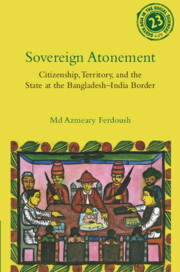Book contents
- Frontmatter
- Contents
- List of figures
- Preface
- Acknowledgments
- Introduction: Remnants, nations, and the sovereign
- 1 Sovereign atonement
- 2 From “sensitive” to “symbolic” spaces
- 3 Land and citizenship as technologies of territory
- 4 Everyday governance: Ambiguity, accountability, and abundance
- 5 Infrastructure, belonging, and the state
- 6 Refusal and tolerance
- Epilogue
- Appendix: A note on methods
- References
- Index
6 - Refusal and tolerance
Published online by Cambridge University Press: 30 April 2024
- Frontmatter
- Contents
- List of figures
- Preface
- Acknowledgments
- Introduction: Remnants, nations, and the sovereign
- 1 Sovereign atonement
- 2 From “sensitive” to “symbolic” spaces
- 3 Land and citizenship as technologies of territory
- 4 Everyday governance: Ambiguity, accountability, and abundance
- 5 Infrastructure, belonging, and the state
- 6 Refusal and tolerance
- Epilogue
- Appendix: A note on methods
- References
- Index
Summary
It was in early July 2015, just a few days before the official exchange of the enclaves, that I was able to meet Sohel Aziz. Sohel was one of the last chairpersons of the soon-to-be extinct enclave councils. In his early forties, Sohel rode a new motorcycle and dressed particularly well – a white shirt tucked into black pants held firmly by a black leather belt matched with shiny black shoes, all visible indicators of his well-to-do financial situation and higher social status. Curious but unsurprised, I started my conversation with Sohel. From the outset he was open and straightforward about himself, perhaps both because the enclaves were going to be exchanged soon and because of his privileged position as a well-connected local leader. At one point, Sohel proudly mentioned that although he was from the enclave and had a house there, he lived with his entire family in another house he owned in “mainland” Bangladesh. He also had a Bangladeshi passport, which he used for travel abroad. I responded to his candor by asking him directly how he had made this happen. There was a brief hesitation accompanied by a shy smile this time, as he assumed I was aware of such arrangements and did not expect me to ask the question to his face. Nevertheless, he soon picked up the pace again:
You know! My family had money. Also, we had relatives living in Bangladesh. So we bought a plot of land beside them and built a house there. That was about twenty or thirty years ago. I used that address to go to school and to get a Bangladeshi passport. But we never left the enclave. We have everything here.
However, Sohel's was not a unique case. This was common across all the enclaves. Anyone who could afford a piece of land or “manage” an address in “mainland” Bangladesh did it for numerous practical reasons (Ferdoush, 2019a) – for example, to go to school, access health facilities, and eventually get a Bangladeshi passport. These arrangements were not foreign to the state officials either; many were aware but chose not to dig more deeply, sometimes from a purely humanitarian consideration and sometimes because they benefited financially from these arrangements.
- Type
- Chapter
- Information
- Sovereign AtonementCitizenship, Territory, and the State at the Bangladesh-India Border, pp. 142 - 161Publisher: Cambridge University PressPrint publication year: 2024

